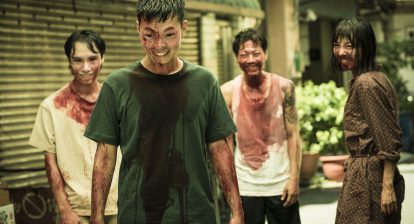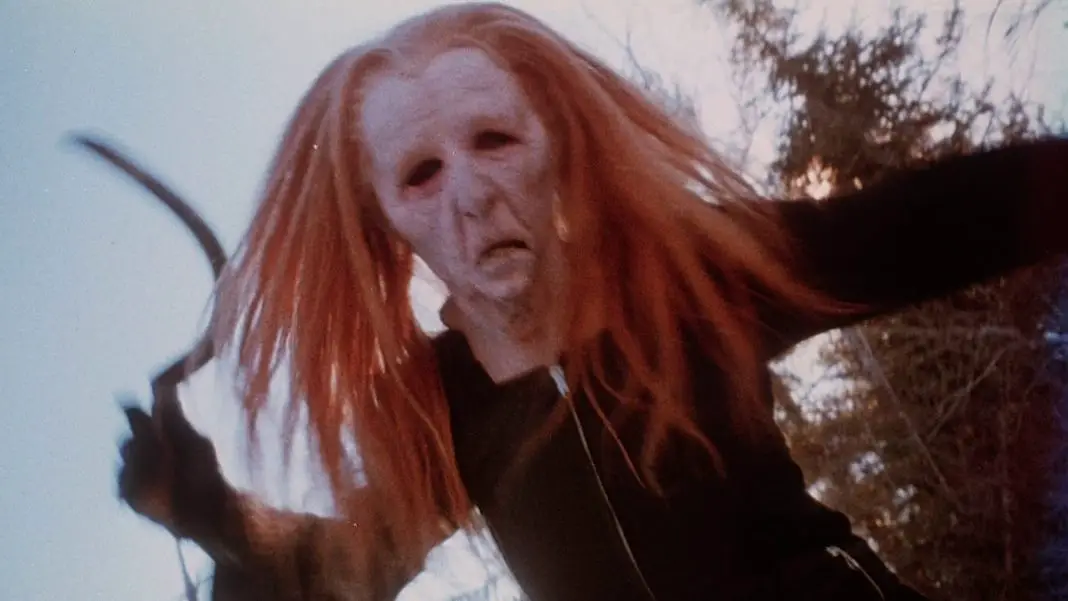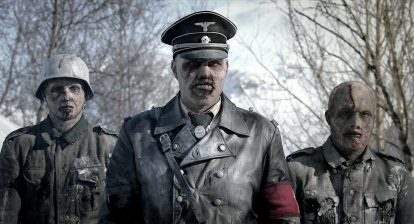I am sure that most of the press surrounding Jeff Barnaby’s Blood Quantum will focus on its being ripped straight from the headlines, given that this is a film made by and centered on the people of Canada’s First Nations finding their way through a viral infection fueled new world order. In a moment when the Wet’suwet’en blockages are still making Canadian headlines, and a virus fueled pandemic is sweeping the globe, the topical timeliness of Blood Quantum‘s central conceits are a public relations dream.
However, to chalk up the pleasures of this movie to a prescience or a fortuitous accident of release dates is to ignore all of the things the film intentionally excels at and how fresh this more representative take on one of genre film’s greatest hits feels. The zombie subgenre is an insanely crowded field, and Blood Quantum mixes classic Romero style social messaging with visual flair and mood to spare in even its goriest moments.
See Also: All the Rage: Why We Still See Debate Over Zombies vs. Infection Movies
Set on the fictional Mi’kmaq reservation of Red Crow in 1981, Blood Quantum focuses primarily on one family in the larger reservation community. Reservation police chief Traylor (Michael Greyeyes) is trying his best to co-parent his son Joseph (Forrest Goodluck) with the help of his ex wife Joss (Elle-Máijá Tailfeathers). Joseph seems more interested in getting in trouble with his older half brother Lysol (Kiowa Gordon) than listening to anything his parents might have to say about his life choices or newly pregnant Caucasian girlfriend, Charlie (Olivia Scriven).

Soon the entire reservation has much larger problems, as something is making the dead (both human and animal) come back to life. A six month time jump shows an almost post-apocalyptic world. The Mi’kmaq are apparently immune to the zombie virus, and have barricaded the reservation as a safe haven, but the white people of the surrounding towns are not. Now. they must contend with both living refugees draining scarce resources, and hordes of the living dead.
The use of infection based zombies to both act as an allegory to and black humored reversal of the effects of colonization is incredibly clever. Viruses like smallpox helped create the system that pushed indigenous peoples onto reservations and out of their birthright, and in the world of Blood Quantum, a virus returns it all back to the rightful owners as the zombie plague spreads amongst the descendants of those oppressors.
See Also: Why George Romero is Both Right and Wrong About Mainstream Zombies
It also feels incredibly fresh to have the indigenous characters allowed to be more than Shamanic helpmeets or caricatures in feathers and buckskin, and this is why marginalized creators getting to tell their own stories is so vitally important. As the characters navigate their feelings toward the refugees and what comes next for the survivors, the allegory is deepened past mere revisionist revenge fantasy. Much larger questions of separatism versus assimilation, and what an ideal end result might look like dominate the back half of the film as much as the gore does.

While more moody and atmospheric than splatter-filled, the kills in the flick manage to feel unique and satisfying when they do happen. Visually, Blood Quantum is a feast, and even before the apocalypse occurs, we are given a world that feels beautifully diseased. Shades of moody slate and faded rust dominate the color palette, tilt camera angles swirling over dark water like the whole planet is about to be sick. By the time swords and chainsaws start slicing skulls, the spray reflected in ruby droplets falling through the high beams of ambulance lights, even the kills take on a quality that feels appealingly like Grand Guignol performance art.
Clever conceits and elegant aesthetics do go a long way toward making the film an engaging viewing experience, but are unable to fully hide the fact the Jeff Barnaby is not a terribly experienced scriptwriter. Issues of pacing and characterization drag down what otherwise soars. The first act rushes through the introductions to the (admittedly rather large, when you account for the rest of the reservation) cast of characters, then bogs down the middle section with heavy-handed explanations of what each person stands for allegorically, without ever really fleshing out who they are. This may be a concession to an audience presumed to be ignorant of the larger historical themes and ideologies at play. As the movie is not unduly obtuse or excessively subtle in its message, this heavy-handedness at the expense of characterization seems a slight misfire.
See Also: Horror Tourism: Take The Romero Road Trip
The end result robs emotional heft out of the final third of the movie, as we never know much regarding the cause of Lysol’s angry separatism other than a deep well of childhood trauma induced angst. Charlie’s mixed race baby is an obvious symbol of the hope for a more integrated future. However, Charlie and Joss are both given little to do as characters in and of themselves. The ladies of the film primarily exist to give both Traylor and Joseph reasons to show up, grow up, and end their characters’ journeys on a redemption arc.
Overall, Blood Quantum is a far smarter than average mix of classical zombie film social commentary and the fresh voice and perspective of a deeply underrepresented community, particularly in genre film. Come for the gorgeously shot gut munching, and stay for the voice of a promising new filmmaker, horror or otherwise.
WICKED RATING: 7/10
Director: Jeff Barnaby
Writer(s): Jeff Barnaby
Stars: Michael Greyeyes, Elle-Máijá Tailfeathers, Forrest Goodluck, Kiowa Gordon
Release: April 27th, 2020 (VOD/Digital)
Studio/ Production Co: Shudder
Language: English
Length: 138 minutes







